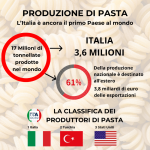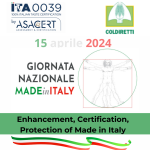The identity of a people is not only defined by its history or language but also by the culture itself. In this sense, few other areas represent the culture of a people as much as culinary culture. This is one of the reasons why World Sustainable Gastronomy Day was conceived.
It is celebrated on June 18, and since its founding on Dec. 21, 2016 thanks to the United Nations Assembly, it is intended to remind the world of the importance of choosing food that respects the environment, in order to promote agricultural development, food security, sustainable food production, responsible consumption and biodiversity conservation.
According to the rankings, over the years there have been improvements in sustainability, greater attention and sensitivity to this issue by decision makers and citizens. In fact, according to a study on sustainable lifestyle conducted by LifeGate on the National Observatory, already a large proportion of Italians, 36 million people, try to use local products and thus develop a sustainable gastronomy. According to Altroconsumo, as many as 76 percent of Italians say they pay attention to environmental impact in their food choices, and 68 percent say they are willing to change bad habits by favoring greener behaviors. In addition, the data states that two out of three Italians would be willing to buy only seasonal fruits and vegetables, while 55% would buy more vegetables and plant-based products. 29% would also spend more on sustainable foods.
In this panorama, Italy has a market share for organic exports of 3.2 percent, placing it sixth in the world rankings and third in the European rankings, climbing positions year by year.
Meanwhile, the area of organic farming in Italy is also growing: our country can count on nearly 2.2 million hectares dedicated to organic farming, which corresponds to a 17 percent share of the total area, the highest in Europe, which is stuck at an average share of 9 percent.
Ismea estimates the value of production at €3.96 billion in 2021, up 11 percent from 2020.
Italy is a world leader in organic products. Appreciated not only on domestic soil, but also and especially beyond the borders. According to a survey of 290 Italian food and wine companies conducted by Nomisma, sales of Italian organic food and wine products on international markets reached 3.4 billion euros in 2022, putting them up 16 percent from the previous year.
The recognition of organic made in Italy in international markets is also evidenced by the long-term growth (+181 percent compared to 2012, a value that has almost tripled) and the export share on the made in Italy basket (weight of 6 percent on total Italian agri-food exports in 2022, compared to 4 percent ten years ago).
Among the most popular Italian organic products are wine, olive oil, cheese, cured meats, canned tomatoes, and pasta.
The main destination markets for Italian organic foods are Germany, France, the Netherlands, Belgium, Austria and Scandinavian countries in Europe, while outside the EU they are popular in the United States, Switzerland, the United Kingdom, Canada, Japan and China.
Add to this the fact that pesticide sales have dropped significantly by 32 percent over the past decade in Italian agriculture, which ranks, therefore, as the greenest in Europe, between 2011 and 2019. This is a trend in contrast to other major producing countries such as Spain and Germany, where pesticide consumption is growing while in France the reduction is just over 10 percent.
The result for consumers is that foreign foods and beverages are six times more dangerous than Made in Italy ones with the number of non-EU agri-food products with irregular chemical residues amounting to 5.6 percent compared to the EU average of 1.3 percent and just 0.9 percent in Italy, according to the analysis based on Efsa data, which extensively analyzed 96. 302 samples of food for sale in the European Union, providing a cross-section of the presence of pesticide residues on fruits, vegetables, cereals, milk and wine produced within EU countries or from abroad.
It follows that Italian production is the healthiest and most sustainable on the continent. Data and evidence that a world day such as this, give way to spread for conscious choices, for the well-being of consumers and the preservation of the planet.
“With the ITA0039 protocol we promote the defense of Italian agrifood heritage and certify it worldwide. -Says Fabrizio Capaccioli CEO of Asacert and creator of the ITA0039 Certification Protocol- A guarantee of wholesomeness and safety for the consumer, an added value for restaurateurs and a help for Italian producers. This is why Asacert stands up for the quality and sustainability of food for a proper and healthy diet, which has always been among the objectives of the ITA0039 Certification Protocol.”






